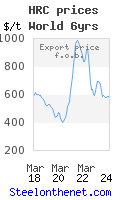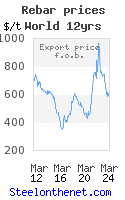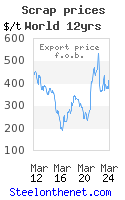Engineering steel in Europe
Steel industry advisers Metals Consulting International have just published an in-depth review of the European engineering steel sector.
In a February 2010 report of ~50 pages, the authors discuss the supply and demand for engineering steel.
Across Europe, 53 producers of engineering steel bar [also known as special bar quality steel, or SBQ] are identified. With a handful of these plants having engineering steel bar capacity at or over 500kt/year (facilities that are located in Germany and in Eastern Europe), average European plant scale is close to ~240kt with the smallest average size being found in Central Europe. Total European output of all 53 facilities is assessed at ~8.4 mt of production in 2009.
Whilst Germany dominates European SBQ trade as a main importer, and Russia is notable as a major exporter, European demand for engineering steel bar is estimated at 8.2mt. This is for 2009, against a world consumption estimate of ~34mt. The European demand of 8.2mt is some 37% down on 2007 consumption levels of ~13mt, with SBQ demand especially hard-hit in Western Europe. SBQ demand collapses since 2007 are assessed as near to ~50% in Western Europe, under 10% in Central Europe but intermediate in Eastern Europe, recent patterns in automotive output being largely responsible for these changes.
Looking forward, with year 2009 consumption very much seen as the ‘low point’ in European engineering steel demand for the period 2007-2013, a slow recovery is foreseen in European SBQ demand. This recovery, whilst not anticipating overall European return to 2007 demand volumes until after 2012, assumes much faster recovery in Central Europe [by 2010] and in Eastern Europe [by 2011], with a return to 2007 production levels in Western Europe only expected around 2014. Gradual relocation of automotive component manufacture to modern large-scale plants in the lower labour cost countries of Central and Eastern Europe is the principal factor shaping this recovery in favour of the former Eastern bloc states.
A number of industry scenarios are outlined for the European engineering steel sector across the medium term. These include supply side consolidation in Germany; passive exit from SBQ production by marginal suppliers wishing to optimise their product mix; large-scale SBQ facility investment in Central Europe; medium-scale SBQ facility investment in Eastern Europe; selected engineering steel asset sales in Romania; outright SBQ business disposals by some of the volume steelmakers; and facility restructuring at selected sites. Probabilities are assigned to each of the scenarios. Reduction of competition in engineering steel production through European M&A activity or plant closure with relocation across Europe from West to East and / or through passive exit from SBQ steel production are judged as high probability outcomes.
Priced at Euro 995, the new report is available for purchase from http://www.steelonthenet.com/SBQ.
blogger@steelonthenet.com
NOTES
About Metals Consulting International Limited [‘MCI’]
Metals Consulting International Limited is a UK-based firm of management consultants who provide clients worldwide with independent consulting services relating to the international metals industries. Services include assistance with steel sector strategy formulation, due-diligence, restructuring, modernisation, business planning, performance turnaround and profit improvement.
About Engineering Steels [‘SBQ’]
Also known as special bar quality or SBQ, engineering steel can be defined as steel that moves [rotates, twists or bends] rather than stand still whilst in use – usual applications extend to crankshafts, gearbox gears, suspension arms, automotive springs and hydraulic components.
In a February 2010 report of ~50 pages, the authors discuss the supply and demand for engineering steel.
Across Europe, 53 producers of engineering steel bar [also known as special bar quality steel, or SBQ] are identified. With a handful of these plants having engineering steel bar capacity at or over 500kt/year (facilities that are located in Germany and in Eastern Europe), average European plant scale is close to ~240kt with the smallest average size being found in Central Europe. Total European output of all 53 facilities is assessed at ~8.4 mt of production in 2009.
Whilst Germany dominates European SBQ trade as a main importer, and Russia is notable as a major exporter, European demand for engineering steel bar is estimated at 8.2mt. This is for 2009, against a world consumption estimate of ~34mt. The European demand of 8.2mt is some 37% down on 2007 consumption levels of ~13mt, with SBQ demand especially hard-hit in Western Europe. SBQ demand collapses since 2007 are assessed as near to ~50% in Western Europe, under 10% in Central Europe but intermediate in Eastern Europe, recent patterns in automotive output being largely responsible for these changes.
Looking forward, with year 2009 consumption very much seen as the ‘low point’ in European engineering steel demand for the period 2007-2013, a slow recovery is foreseen in European SBQ demand. This recovery, whilst not anticipating overall European return to 2007 demand volumes until after 2012, assumes much faster recovery in Central Europe [by 2010] and in Eastern Europe [by 2011], with a return to 2007 production levels in Western Europe only expected around 2014. Gradual relocation of automotive component manufacture to modern large-scale plants in the lower labour cost countries of Central and Eastern Europe is the principal factor shaping this recovery in favour of the former Eastern bloc states.
A number of industry scenarios are outlined for the European engineering steel sector across the medium term. These include supply side consolidation in Germany; passive exit from SBQ production by marginal suppliers wishing to optimise their product mix; large-scale SBQ facility investment in Central Europe; medium-scale SBQ facility investment in Eastern Europe; selected engineering steel asset sales in Romania; outright SBQ business disposals by some of the volume steelmakers; and facility restructuring at selected sites. Probabilities are assigned to each of the scenarios. Reduction of competition in engineering steel production through European M&A activity or plant closure with relocation across Europe from West to East and / or through passive exit from SBQ steel production are judged as high probability outcomes.
Priced at Euro 995, the new report is available for purchase from http://www.steelonthenet.com/SBQ.
blogger@steelonthenet.com
NOTES
About Metals Consulting International Limited [‘MCI’]
Metals Consulting International Limited is a UK-based firm of management consultants who provide clients worldwide with independent consulting services relating to the international metals industries. Services include assistance with steel sector strategy formulation, due-diligence, restructuring, modernisation, business planning, performance turnaround and profit improvement.
About Engineering Steels [‘SBQ’]
Also known as special bar quality or SBQ, engineering steel can be defined as steel that moves [rotates, twists or bends] rather than stand still whilst in use – usual applications extend to crankshafts, gearbox gears, suspension arms, automotive springs and hydraulic components.
Labels: demand, engineering steel, Europe, SBQ, special bar quality, supply




0 Comments:
Post a Comment
<< Home